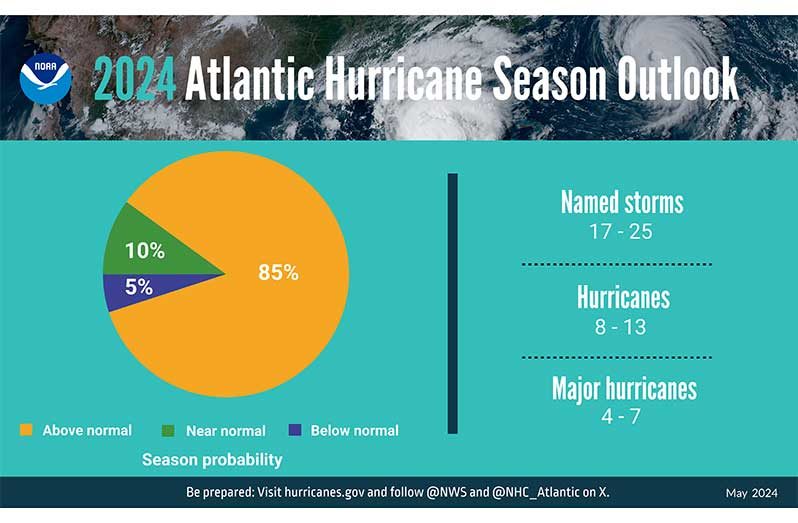Prime Ministers call for Climate-Crisis funding
HURRICANE Beryl, an unprecedented category 4 storm, caused extensive destruction upon its arrival in the Caribbean nearly a fortnight ago.
Beryl set a record for the first-ever Category 4 storm in June in the Atlantic, making landfall on Carriacou, in Grenada, and wrecking nearby islands.
St. Vincent and the Grenadines, Jamaica, Barbados, and St. Lucia were among some of the Caribbean States that were affected during Beryl’s passage across the region.
Thousands of people across Grenada and St. Vincent and the Grenadines were left homeless by the storm. Schools, businesses and crops were all destroyed, and, in some islands, fatalities were recorded.
“Together, they constitute Beryl’s Armageddon,” said St. Vincent and the Grenadines Prime Minister Dr. Ralph Gonsalves, as he pleaded for international community funding to address the climate crisis and rebuilding efforts.
“In just a few hours, entire islands were decimated,” Prime Minister Gonsalves told journalists and various stakeholders at a joint press conference facilitated by the United Nations last week.
“The climate crisis is too high for us alone to pay for, to bear the brunt of all people. Our societies, our islands, want to stay alive. We deserve to stay alive,” Grenada’s Prime Minister, Dickon Mitchell, said as he too highlighted the urgent need for timely assistance and capital investment in Small Island Developing States.
Despite contributing less than 10 per cent of the global greenhouse gas emissions- the Caribbean and Latin America continue to bear the brunt of the accelerating climate crisis; that was evident in Beryl’s passage across the region.
“Hurricane Beryl is the first major hurricane of the season. It’s built up to category four quick and it affected many nations. Even as [it] tapered off as a category one, the devastation has been significant,” Mitchell stressed.
ABOVE NORMAL
Back in May, the National Oceanic and Atmospheric Administration (NOAA) predicted above-normal hurricane activity in the Atlantic basin this year.
The Washington, D.C., United States scientific and regulatory agency charged with forecasting weather, monitoring oceanic and atmospheric conditions predicted that the 2024 Atlantic hurricane season, which spans from June 1 to November 30, could see a 85 per cent chance of an above-normal season, a 10 per cent chance of a near-normal season and a five per cent chance of a below-normal season.
The NOAA forecasted a range of 17 to 25 total named storms (winds of 39 mph or higher). Of those, 8 to 13 are forecast to become hurricanes (winds of 74 mph or higher), including 4 to 7 major hurricanes (category 3, 4 or 5; with winds of 111 mph or higher).
“The upcoming Atlantic hurricane season is expected to have above-normal activity due to a confluence of factors, including near-record warm ocean temperatures in the Atlantic Ocean, development of La Nina conditions in the Pacific, reduced Atlantic trade winds and less wind shear, all of which tend to favour tropical storm formation,” the NOAA said.
Beryl became the strongest June hurricane, it morphed into the earliest category 4 hurricane on record. Hurricane Ivan in 2022 was the last strong hurricane to hit the region, causing catastrophic damage in Grenada.
THE CARIBBEAN’S RESILIENCE
The Caribbean Disaster Emergency Management Agency (CDEMA) Executive Director, Elizabeth Riley, emphasised the need for resilience in the face of natural disasters, citing the rapid intensification of systems in the Caribbean as a future.

“CDEMA has been [underscoring] the importance of being resilient as a people…It has to do with the mental conditioning of our population, really making sure that our residents are aware, but also accept the level of vulnerability that we face in the region,” Riley said while providing an update on the regions response to Beryl recently.
In an immediate response, the Community (CARICOM) has been rounding up support for those nations that have been affected. CDEMA, Riley noted has been stepping up its capabilities in the region and participating members have been collaborating.
“One of the things that the meteorologists told us at the start of the season was about the risk of rapid intensification of systems,” Riley explained while highlighting the efforts that have been made to ensure a rapid response in the aftermath of Beryl.
“We knew we had record high temperatures in the Atlantic as well as in the Caribbean Sea. And those predictions were fully borne out with Beryl where we saw a rapid intensification from a tropical depression all the way through to a category five system in a few short days.”
Within hours of Beryl’s passage, the CDEMA coordinating unit activated the regional coordination plan. Emergency operation centres were activated across the islands that were affected.
While the region has mustered support for the islands that have been affected, the reality of what is to come still lingers.
“The realisation that what we have seen happen by Beryl is likely to be common picture future going forward…these are the realities that we are going to be facing.”
“It’s going to be absolutely critical that we step up our own capabilities in the region. Our ability to help ourselves is going to continue to be very, very critical,” Riley added.












